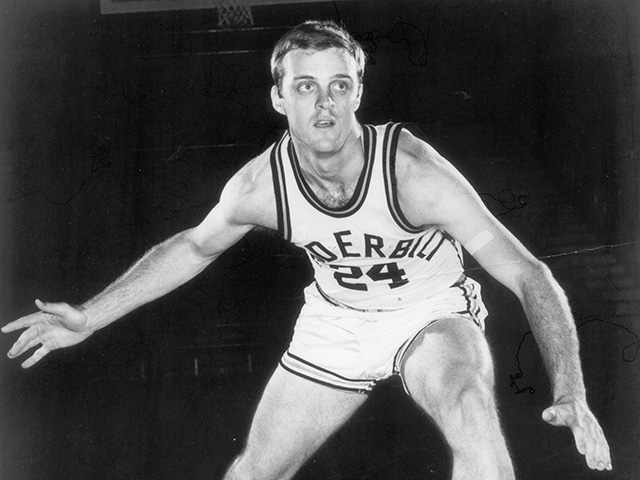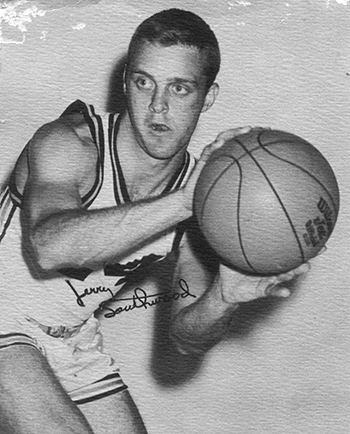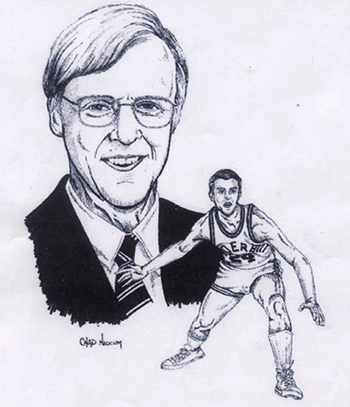Feb. 11, 2015

Commodore History Corner Archive
Former Vanderbilt guard Jerry Southwood (1965-67) was such a desired high school basketball player that coaching legends John Wooden (UCLA) and Adolph Rupp (Kentucky) sought his skills for their programs. Also in the mix were Tennessee, Florida, Michigan, Illinois and Purdue.
Southwood’s older brother by 16 years, Gene (1950-52), was part of Vanderbilt’s first full recruiting class for Coach Bob Polk. Both were Evansville, Ind., natives, and Jerry played for Benjamin Bosse High School, averaging 15.3 points per game in three seasons while winning a state championship as a junior.
“The biggest influence my brother had for me to attend Vanderbilt was saying I couldn’t play football,” Southwood recently said from his Montana home. “In high school I played football, basketball and ran track. My brother told me the best way to get an education was in basketball and I liked Coach Roy Skinner. Coach Skinner was very low-key and did not holler, scream and curse at you like some coaches did.
“Vanderbilt started following us (along with teammate Gene Lockyear) since we were juniors. It just seemed like a good fit. Dave Kardokus and Jack Heldman, who played at Vanderbilt in Gene’s class, were from Indiana. They were good people and had good experiences at Vanderbilt. Coach Skinner was the kind of coach I really enjoyed being around. He and Coach (Don) Knodel, his assistant, were good people and certainly a contrast to Coach Rupp.”
Joining Southwood in 1963 as freshmen were Lockyear, Kenny Gibbs, Kenny Campbell, Dave Boswell and Ron Knox. In this era of college athletics freshmen were ineligible for varsity competition. Southwood said that during the season the varsity upset a prominent Duke squad in overtime in Memorial Gym and he could see the Commodores’ future was bright. When the freshmen home games were played prior to the varsity game, fans arrived early to find seats as Memorial was always packed. Southwood, a 6-foot-2, 190-pounder, started at point guard, averaging 13.7 points per game on a freshman team that went 11-4.
As a sophomore, Southwood was part of a team that was 22-4 (SEC 15-1) and won the university’s first SEC basketball championship with players like Bob “Snake” Grace, John Ed Miller and All-American center Clyde Lee. Southwood and Roger Schurig missed the second half of the season due to academic ineligibility. Said Southwood, “Coach Knodel always thought if Roger and I had been there Vandy would have won the national championship.”
Vanderbilt defeated DePaul (83-78) in the first round of the NCAA Mid East Regionals and advanced to play No. 1 ranked Michigan with their All-American Cazzie Russell. The game was close throughout and wasn’t decided until the final minute of the game.
The Wolverines had taken a one-point lead when one of the most controversial calls in Vanderbilt basketball history went against the Commodores. Miller drove to the basket for a lay-up and two points. But an official signaled that Miller walked and disallowed the basket. Vanderbilt had to foul the rest of the game in desperation. Michigan held on for an 87-85 victory.
“Roger and I were there for the Michigan game,” Southwood said. “That game put Vanderbilt basketball on the map. They had some good teams prior to that game in the late 1950s with Coach (Bob) Polk, Al Rochelle, Babe Taylor and that bunch. Vanderbilt was high in the rankings. The Michigan game vaulted us up to another level and Clyde was a senior the next year. That was also a very good team. The loss on a walking call on John Ed Miller was a heartbreaker.
“Any game you play will have some good and bad calls. It was unfortunate that they made that call as we were on the wrong end of it. If you play enough games you learn everybody remembers the last free throw missed, but nobody remembers the first one. The first one is as important as the last one. While it was a bad call against John Ed there were probably some calls that incurred during the game that none of us remember that could have put us ahead, but not as vital.”
 Vanderbilt lost some key players the next season as Southwood was back as the Commodores starting point guard. The team went an unexpected 22-4 with a 13-3 mark in the SEC for a second-place finish. Vanderbilt did add future First Team All-SEC players with Bob Warren and Bo Wyenandt. Lee was a senior captain on that 1965-66 team.
Vanderbilt lost some key players the next season as Southwood was back as the Commodores starting point guard. The team went an unexpected 22-4 with a 13-3 mark in the SEC for a second-place finish. Vanderbilt did add future First Team All-SEC players with Bob Warren and Bo Wyenandt. Lee was a senior captain on that 1965-66 team.
“I believe that team had the distinction of being the highest ranked team (No. 2) in Vanderbilt history,” said Southwood. “One of the early highlights was playing in the Los Angeles Classic. Syracuse played in it that year with Dave Bing, who became an outstanding NBA player. Jim Boeheim, the present day coach at Syracuse, was on that team.
“We played them in the opening round and were both ranked. Clyde and Keith Thomas had outstanding games. Bing was phenomenal and was the best that I’d ever played against. He played guard and forward. When he played guard I tried to stay with him, which was a joke. And when he played forward Bo Wyenandt tried to stay with him and that wasn’t so good. He had 40-plus points, but we won 113-98.
“The next night we played Southern Cal and lost at the buzzer (74-72) on a block/charge call. The guy for Southern Cal was actually named (John) Block. Bo was set and Block ran over him for a blocking call. He made two free throws and the game was over. We were hoping to play UCLA, but the next night we played Purdue. Purdue had a kid I played against in high school named Dave Schellhase. He became the MVP of the Big Ten that year. We beat them 94-72 and it wasn’t a game.”
Other Commodores on that team were Wayne Calvert, Ron Green, Gibbs, Campbell, Lockyear, Knox and Boswell. Vanderbilt lost twice to Kentucky that season, which was the difference between second place and another SEC championship. Kentucky lost that season to Texas Western in the NCAA Finals.
In that season, Southwood averaged 8.0 points and 3.5 rebounds per game. He led the team with 94 assists (only home game assist records were kept). In Southwood’s senior year SEC basketball would be desegregated with the arrival of Commodore freshmen Perry Wallace and Godfrey Dillard. Perry became the first black basketball player in the SEC the next season. Dillard would eventually transfer without seeing any varsity action.
“Most of the people on our team were from Indiana, Illinois, Missouri, Ohio and Kentucky so playing with and against black players was not a big deal,” said Southwood. “That sounds strange, but it is the truth. We played with and against blacks all the time. Coach Skinner never came to us and said here’s the deal, `We’ve got these two kids bringing into the fold.’ They were just part of the team. The tragedy is we were either too young or just didn’t grasp the situation the way we did in latter years. That’s what everybody really talked about. Nobody talked about our team since Clyde was gone and we were going to be a disaster.
“That was the feeling. Coach Knodel had left and we didn’t have a scoring guard like Keith Thomas. Expectations were if we won half our games that would have been great. It turned out to be a pretty good team especially when Tom Hagan came on the scene and became a true All-American at Vanderbilt. Bobby Warren and Bo were fantastic while Kenny Gibbs picked up the slack. Kenny Campbell came off the bench to replace Bo and once scored 30-plus points. It really was a team that is forgotten.”
That “unforgotten” team was 21-5, 14-4 in the SEC, and good enough for another second-place finish. Southwood was team captain averaging 10.3 points and 4.7 rebounds per game. Southwood won the team trophy for best free-throw percentage (79.2).
“We won four games in overtime all on the road,” said Southwood. “It was a special time and you just had to be part of it. One night Bobby (Warren) might score 30 points and another night Bo might score 30 points. Both Kenny’s might score a bunch and I would on occasion score some. Hagan was always there.
“As far as getting more bang for your buck and more value for your dollar that team is totally forgotten because Perry and Godfrey were freshmen and broke the color barrier in the SEC for basketball, which was a huge deal. I don’t mean to downplay that, but in the day we only played 25-26 games a year and we won 21 out of that. You can win 20 now, but you play 35 games.”
Southwood was named Second Team All-SEC by UPI and Third Team All-SEC by AP. He was named as one of the 10 best Vanderbilt players for the 1960s decade. It was said “Southwood directed the Commodores like a coach on the floor.” Over the three seasons that Southwood was a Commodore, his teams held the highest winning percentage (83.8) of any Vanderbilt squads. Their record was 67-13. In his three seasons in high school Southwood’s teams were 64-13.
Southwood does like to talk about one particular game during his junior year on Dec. 17, 1965 and its aftermath many years later.
“I had some good games like the Bobby Knight game,” Southwood said. “Coach Knight was at Army and it was Clyde’s senior year. They wanted to upset Vanderbilt and did whatever it took to shut down Clyde Lee in Memorial Gym. Clyde did not have one of his best games and I scored 23 points and we won. Coach Knight could not believe it. I didn’t think anymore about it. When C.M. Newton was at Vanderbilt he asked me to be a host when Memorial Gym hosted a Regional in the NCAA Tournament.
“Knight and his Indiana team were a participate. C.M. asked me if I wanted to meet Robert. He didn’t call him Bobby. I told him that would be great. This was in the 1980s and I had never met Coach Knight. We walked into the press room after a press conference and C.M. called out `Robert, I want you to meet somebody.’ Knight said I don’t want to meet that son of a …..; he could never play.’ He walked out and never said a word to me, never. I was trying to figure that out.
“There was a reception that same night at the Belle Meade Country Club and the same thing happened again. Finally, somehow we started to piece it together that he remembered losing to us and my scoring night. That was his sense of humor. It was funny at the time and we did talk. My son was actually a basketball manager at Indiana for Coach Knight. He got to be part of that story himself. The way Knight would tell the story I scored 50 points.”
Southwood was selected by the Baltimore Bullets (18th round) in the 1967 NBA Draft and by Dallas (11th round) in the ABA. He graduated from Vanderbilt in August of that year. Southwood did go to Baltimore and played in a few exhibition games with fellow rookie and future NBA Hall of Famer Earl Monroe.
Said Southwood, “I had played ball all my life and I knew I was probably done at the end of college. My world shifted from an offensive player when I was in high school to a point guard in college.”
Southwood did become an assistant coach at Vanderbilt for the 1967-68 season and the following year.
“I have a degree in history and wanted to coach,” Southwood said. “Bobby Bland was the freshman coach and Roy asked me to help them. It was a good experience while I worked with the freshmen team. Roy tried to help me get a job at the high school level, but they wanted you to also teach. I knew I would not be a good teacher. I had a good time and thanked Roy.
“Everyone was wonderful to me. Coach Bland had played there and was an all-conference player. Bobby developed kidney failure and later died. Life at Vanderbilt would have been different if Bobby had lived. He was a great basketball player and mirrored Coach Skinner and Coach Knodel. He was soft spoken and never raised his voice. He’d say, `Here’s our plan. This is what we are going to do.’ It was a tragedy that he could not recover from his kidney ailment.”
 Southwood worked 25 years (1986-2011) in the Nashville Public Relations firm Dye, Van Mol & Lawrence, Inc. as Chief Financial Officer and part owner. He also coached for 15 years in a Church Basketball League and served as the first president of the Vanderbilt Rebounders (the men’s basketball alumni organization) in 1981-82.
Southwood worked 25 years (1986-2011) in the Nashville Public Relations firm Dye, Van Mol & Lawrence, Inc. as Chief Financial Officer and part owner. He also coached for 15 years in a Church Basketball League and served as the first president of the Vanderbilt Rebounders (the men’s basketball alumni organization) in 1981-82.
Southwood, 69, is somewhat a Commodore basketball historian, who in 2001 produced and directed “50 Years of Memorial Magic” — a video history of men’s and women’s basketball in Memorial Gym. Most of the research and photos were from his personal collection that was donated to the Vanderbilt University Jean and Alexander Heard Library, where they are housed in a special collection.
In 2002, Southwood was presented with the Ken Hudgens Award for dedication and loyalty to the Vanderbilt Athletic Department. Southwood is retired and lives in Montana. In 2011, Southwood was selected into the Indiana Basketball Hall of Fame. He was asked to reflect on being a former Commodore basketball player.
“Those teams that I played stay in touch,” said Southwood. “We used to have the old `Skinner Lunch’ for a long time. We had a lot of fun and Coach Skinner and Coach Knodle were wonderful to be around. They knew how to handle and get the most out of us. I have nothing, but the best memories of the kids I played with that are now grown and live in places around the country. We know their kids and grandkids.
“When we come back to Nashville, Snake (Grace) usually gets John Ed, Clyde, Calvert, Lockyear, Campbell and Rod Freeman. There’s a whole group. The last Skinner lunch was the month before he died. We had about 25 people to attend. We knew Roy’s health wasn’t good. It was very gratifying for our senior group to win 22 games after everyone told us we’d be lucky to win anything without Clyde Lee. I don’t know if percentage-wise that our three-year record will be beaten.”
Traughber’s Tidbit: Dave Kardokus (1950-52) died on Sept. 6, 2014 at age 84. He was part of Coach Bob Polk’s first full scholarship class (Kardokus, Gene Southwood, Jack Heldman, George McChesney and Bob Smith). Kardokus led the Commodores to the 1951 SEC Tournament finals’ upset win over Kentucky, 61-57. It was the only SEC Tournament victory in either era until the Commodores defeated Kentucky for the title in 2012. Kardokus was the second player in Vanderbilt history to earn First Team All-SEC (Billy Joe Adcock was the first) while leading his class in scoring and rebounding for all three seasons.
On Aug. 25, 2014, Bob Warren (1966-68) died at age 67. He was First Team All-SEC and the SEC Sportsmanship Award winner as a senior. Warren played professional basketball in the ABA for Los Angeles, Memphis, Carolina, Dallas, Utah and San Antonio before being drafted by the NBA Hawks.
If you have any comments or suggestions contact Bill Traughber via email WLTraughber@aol.com.

